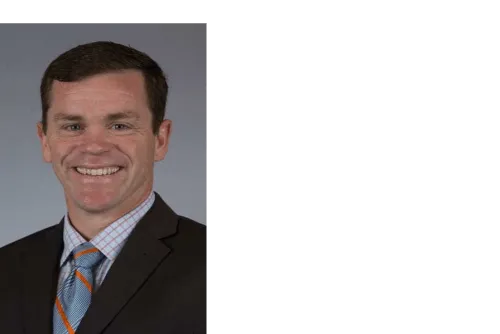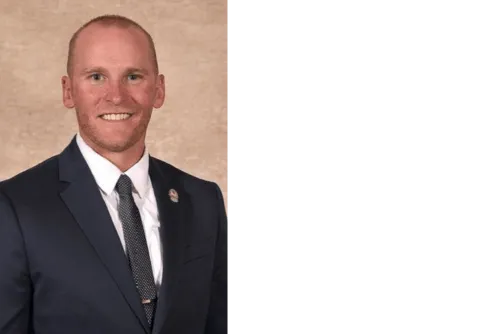
Ethics in Sport
Winning with Integrity.
Sport encompasses many opportunities for the application of ethics, whether you are playing, refereeing, coaching, or are involved in the management of a sport organization. It is easy to venture down a road of unethical decisions because at its core, sport competition is about winning. Bill Daniels understood there was a greater meaning behind sport management. In 1980, he made the very personal and ethical decision to repay with interest every stakeholder affected by the bankruptcy of the Utah Stars.
Ethics Fellows in this Focus Area
More Info
Ethics in Sport
Are you a student interested in working with an Ethics Fellow? Learn more about the DFEI at UCCS Ethics Ambassador Program.
Related Resources
Abstract
The article analyzes the concept of partnership and specifically explores the significance for the operation of partnerships, in the areas of youth and community sport, of the perspectives that partners bring to these relationships. The general context for the analysis is the increasing use of partnerships by government for the achievement of its sport policy objectives. The article examines the triangular relationship between School Sport Partnerships (SSPs), National Governing Bodies of Sport (NGBs), and County Sport Partnerships (CSPs). The specific context for the analysis is the decision by the Secretary of State for Education to remove funding from SSPs and the impact that this had on the triangular relationship. The study uses data from a number of semi-structured interviews and questionnaires with CSP and NGB representatives to explore their interpretations of this change.
Harris, S., & Houlihan, B. (2015). Competition or coalition? Evaluating the attitudes of National Governing Bodies of Sport and County Sport Partnerships towards School Sport Partnerships. International Journal of Sport Policy and Politics, 8(1), 151-171. doi:10.1080/19406940.2015.1024708
Abstract
The paper aims to utilize Adam and Kriesi's network approach to policy analysis to examine the range of exogenous factors that affect interactions in the community sport policy process from a local authority perspective.
Read more: Delivery networks and community sport in England
Harris, S., & Houlihan, B. (2014). Delivery networks and community sport in England. International Journal of Public Sector Management, 27(2), 113-127. doi:10.1108/ijpsm-07-2013-0095
Abstract
Voluntary sports clubs (VSCs) account for about a quarter of all volunteering in England. The volunteers work in a mutual aid, self-production, self-consumption system whose main purpose is identifying and nurturing high-level performers. But the new HMG/Sport England strategies leading to London 2012 expects volunteers to make a major contribution to sustaining and extending participation. The study utilized six focus group sessions with a total of 36 officials and members of 36 clubs across the six counties of Eastern England to assess whether and to what extent government policy objectives can be delivered through the voluntary sector. The study focused on the perceptions and attitudes of club members about being expected to serve public policy and the current pressures they and their clubs face. The results lead the authors to question the appropriateness, sensitivity, and feasibility of current sport policy, particularly the emphasis on VSCs as policy implementers.
Harris, S., Mori, K., & Collins, M. (2009). Great Expectations: Voluntary Sports Clubs and Their Role in Delivering National Policy for English Sport.VOLUNTAS: International Journal of Voluntary and Nonprofit Organizations, 20(4), 405-423. doi:10.1007/s11266-009-9095-y
Abstract
The Olympic Legacy Plan has been a governmental concern prior to the London 2012 Games, particularly, the aspiration to use the event to inspire participation in sport. However, scant attention has been directed towards the voluntary sector and its role as a delivery agent of the legacy aspirations. New policies for community sport set out a clear focus on using national governing bodies and voluntary sports clubs (VSCs) to deliver growth in adult sports participation and to reduce the proportion of participants dropping out of sport by the age of 25. How far voluntary organizations are aware of and comply with top-down approaches to policy implementation is debatable, particularly when considering the origins and motives of voluntary clubs, their heterogeneous characteristics and their general indifference towards national sport-related policy. This relationship forms the basis of this inquiry. It draws from implementation theory and seeks to explore how far VSCs are aware of policy goals and to understand club management practices and their likely impact on the role of the VSC in delivering community sport policy goals.
May, T., Harris, S., & Collins, M. (2012, October 31). Implementing community sport policy: Understanding the variety of voluntary club types and their attitudes to policy. International Journal of Sport Policy and Politics, 5(3), 397-419. doi:10.1080/19406940.2012.735688
Abstract
Research questions: Community sport policy is at the center of the London 2012 Olympic and Paralympic Games legacy plans. Specifically, the policy goal is to achieve year-on-year growth in mass sports participation. The government has committed significant public funding to the policy (£950 million between 2008 and 2017), a specific delivery system has been developed, and a number of techniques have been employed to manage and oversee policy implementation. This paper utilizes Marsh and Smith's [(2000). Understanding policy networks: Towards a dialectical approach. Political studies, 48, 4-21. doi:10.1111/1467-9248.00247] dialectical network approach to examine the community sport policy process, drawing particular attention to the effect of contemporary technologies of governing policy implementation [Green, M. (2009). Podium or participation? Analyzing policy priorities under changing modes of sport governance in the United Kingdom. International Journal of Sport Policy and Politics, 1(2), 121-144. doi:10.1080/19406940902950697].
Harris, S., & Houlihan, B. (2016). Implementing the community sport legacy: The limits of partnerships, contracts and performance management. European Sport Management Quarterly, 16(4), 433-458. doi:10.1080/16184742.2016.1178315
Located in a picturesque town along the Elkhart River in northern Indiana, the Fighting River Runners joined an NCAA Division I Football Conference. Attendance at football games has been strong, but has had fluctuations. At some of the key rivalry and Homecoming games, each game was sold out, but at other games, there were many empty seats. In order to improve the image of the college during less attended football games, the University started to give away extra tickets on the day of the game, so that the stadium was full during televised games. Crowds of teenagers and other fans started gathering early in the morning and some were camping out the night before to get the tickets. View Full Article: "Underage Drinking or Just a Stadium That is Too Small?"
In May of 2012, retired professional football player Junior Seau committed suicide. Because of this horrific incident, his family has joined a class action suit started by other retired football players and their families against the National Football League. These families are suing the NFL stating that loved ones, like Seau, have suffered from depression caused by chronic traumatic encephalopathy (CTE) which is associated with repeated head trauma. View Full Article: NFL and Retirement Benefits?
The Daniels Fund Ethics Initiative Collegiate Program in the UCCS College of Business and the Sport Management program in the College of Business at UCCS co-sponsored a series of events on October 8, 2015 titled, "From FIFA to the Pitch, the Ethics of Soccer." The goal was to assemble a diverse panel of industry participants that can discuss ethical issues associated with the management and playing of soccer at the league level, club executive level, and club coaching or playing level. Panelists included:
Jill Ellis - USA Women's National Team and World Cup Champion Head Coach
Robert Elstone - CEO Everton Football Club, Liverpool, England
Eric Wynalda - FOX Sports soccer analyst and US & MLS player
Padraig Smith - Sporting Director, Colorado Rapids UEFA Financial Fair Play
The DFEI Collegiate Program at UCCS COB and the Sport Management program in the College of Business at UCCS co-sponsored a series of events on November 14, 2017 titled, "Winning with Integrity." The goal was to assemble a diverse panel of industry participants that can discuss ethical issues associated with the management and playing of soccer at the league level, club executive level, and club coaching or playing level. Panelists included:
Landon Donovan - US Men's National Soccer Team, Former Major League Soccer star
Becky Sauerbrunn - US Women's National Soccer Team, Olympic Gold Medalist, FC Kansas City
Richard Motzkin - Sports Agent for Wasserman Media Group, LLC
Padraig Smith - Sporting Director, Colorado Rapids UEFA Financial Fair Play




